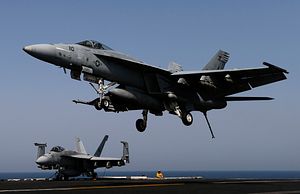As Ankit noted last week, President Barack Obama has ordered airstrikes against Islamic State of Iraq and al-Sham (ISIS) targets in northern Iraq. Besides preventing genocide, the purpose of these airstrikes are to contain and eventually defeat ISIS in Iraq. To that end, Obama has said the airstrikes may go on for many months.
Paradoxically, however, the airstrikes may empower ISIS and make it a greater threat to the West.
To begin with, prolonged airstrikes greatly increase the risk of ISIS-inspired terrorist attacks against Western homelands in two ways. First, they make it more likely that ISIS will target the West. Although they ultimately split over leadership of the jihad in Syria, ISIS and al-Qaeda’s longest running dispute is over whether to target the near or far enemy. While both groups ultimately seek to establish the caliphate, they differ over the best means to achieve that goal.
Al-Qaeda has long argued that in order to establish the caliphate, the U.S. must first be ejected from the Middle East. Consequentially, it has targeted the United States in its attacks. By contrast, ISIS has viewed sparking sectarian conflict as the best means in achieving the Caliphate. Thus, it has targeted Shiite targets to get Shiites to overreact in retaliating, which would allow the group to portray itself as the protector of the Sunni people.
Prolonged U.S. airstrikes threaten to change ISIS’s calculus. If the U.S. is perceived to be blocking its ambitions in the Middle East, the group is likely to turn its sights on the far enemy.
Of greater concern to the West, prolonged airstrikes threaten to increase lone wolf terrorist attacks against the West. One of the more disconcerting aspects of ISIS’s rise for Western governments has been the large number of Westerners who have been traveling to the Middle East to fight with ISIS in Syria and Iraq. This has greatly alarmed Western governments who fear these citizens will one day return to their homelands and put their newfound fighting skills to use.
Prolonged airstrikes create a new kind of threat from these Western Jihadists. Specifically, these Westerners are motivated by a desire to aid ISIS in its cause to establish the caliphate. Since the U.S. has at least been tactically aligned with ISIS in Syria, these Westerners have had to travel to the Middle East to assist ISIS. However, with the U.S. now fighting ISIS directly in Iraq, Western Jihadists who might have otherwise traveled to the Middle East may now decide that they can best aid ISIS’s cause by attacking the U.S. or Western targets at home.
Besides raising the threat of terrorist attacks at home, prolonged U.S. airstrikes against ISIS threaten to empower ISIS both regionally and in Iraq. Despite managing to escape the U.S. invasion of Afghanistan in 2001, terrorism experts generally agree that al-Qaeda was nearly a spent force by the end of 2002. The group was rejuvenated, at least temporarily, by the U.S. invasion of Iraq in 2003, which led thousands of young Sunni men across the Arab world to join al-Qaeda in what they perceived to be a more traditional defensive jihad.
Airstrikes are not likely to have as large an impact as the U.S. invasion and occupation of Iraq. However, they still create the impression in the minds of many Sunnis that the U.S. is joining forces with Shiites across the region to keep the Sunnis down. Moreover, ISIS will gain popularity by portraying itself as the vanguard fighting to protect the region from the Western infidels. In a region in which the U.S. is as unpopular as it is throughout the Arab world, this could be a huge boon for recruiting efforts.
Perhaps most troubling, prolonged U.S. airstrikes against ISIS are likely to eliminate the one path towards eliminating ISIS in Iraq over the short-term. Given the poor showing of Shiite and Kurdish troops, the only viable path to eliminating ISIS’s influence in Iraq in the short-term lies with the Sunni tribes. If the Sunni tribes rise up against ISIS, the group will likely struggle to retain its position in the country.
Fortunately, in the weeks before U.S. airstrikes began, there were a number of signs of growing Sunni dissatisfaction with ISIS in both Iraq and even some parts Syria. Should the U.S. air attacks extend to Sunni areas of Iraq, resistance to ISIS among Arab Sunnis is likely to evaporate. The U.S. is unable to perfectly distinguish between ISIS militants and non-ISIS Sunni fighters. As a result, some of the latter will become collateral damage in the attacks. Faced with the presence of hostile outsiders, a rally-around-the-flag effect is likely to take hold. Indeed, this is how the current crisis in Iraq started, when hostility towards the Shi’a Iraqi government led the Sunni tribes and ISIS to unite in removing it from their territories.
Thus, while the U.S. airstrikes are undoubtedly trying to mitigate the ISIS threat in Iraq, they are just as likely to have the opposite effect.

































